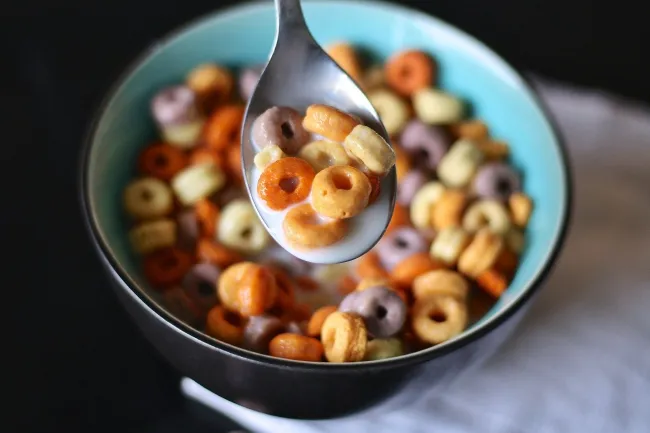This paper explores the association between consumption of ultra-processed foods and indicators of obesity in a sample of the UK adult population, using data from the National Diet and Nutrition Survey between 2008 and 2016.

The authors classified food items consumed by the study participants according to the NOVA framework, which co-author Carlos Monteiro developed. For more details, see the Foodsource building block What is ultra-processed food? And why do people disagree about its utility as a concept?
The results show that on average, 54% of the calories consumed by UK adults come from ultra-processed foods (such as ready meals, breakfast cereals, sausages, biscuits and cakes), 31% from unprocessed or minimally processed food, 10% from processed foods and 5% from culinary ingredients (such as oil and table sugar).
Higher consumption of ultra-processed food was associated with higher Body Mass Index, greater waist circumference and higher prevalence of obesity in both sexes. Specifically, a 10% increase in ultra-processed food consumption was linked to an 18% increase in obesity prevalence in men, and a 17% increase in women.
The authors suggest several mechanisms that could explain the link, including the theory that ultra-processed foods promote overconsumption. Note, however, that this is an observational study rather than a randomised controlled trial, so it cannot prove the cause of the observed association.
See also the paper Ultra-Processed Diets Cause Excess Calorie Intake and Weight Gain: An Inpatient Randomised Controlled Trial of Ad Libitum Food Intake and two responses to that paper here: Responses to study on ultra-processed foods and weight gain.
Abstract
We examined the association between the consumption of ultra-processed foods and adiposity in a nationally representative sample of the UK adult population. We studied 6,143 participants (19 to 96 years, 51.6% female) sampled by the UK National Diet and Nutrition Survey (2008–16). Food items reported in four-day food diary were classified according to the NOVA system. Multiple linear and logistic regressions were used to evaluate associations between the dietary contribution of ultra-processed foods (sex-specific quartile and continuous) and Body Mass Index (BMI), Waist Circumference (WC) and obesity (BMI>30kg/m2) and abdominal obesity (men: WC≥102cm, women: WC≥88cm) status. Models were adjusted for sociodemographic and lifestyle characteristics. In multivariable analyses, the highest consumption of ultra-processed food was associated with 1.66 kg/m2 higher BMI (95%CI 0.96–2.36), 3.56 cm greater WC (95%CI 1.79–5.33) and 90% higher odds for being obese (OR = 1.90, 95%CI 1.39–2.61), compared with the lowest consumption. A 10% increase in the consumption of ultra-processed foods was associated with an increase of 0.38 kg/m2 in BMI (95%CI 0.20–0.55), 0.87 cm in WC (95%CI 0.40–1.33) and 18% higher odds of being obese (OR = 1.18, 95%CI 1.08–1.28). The consumption of ultra-processed food was associated with an increase in BMI, WC and prevalence of obesity in both sexes. A dose response relationship was observed in both sexes, with a 10% increase in the consumption of ultra-processed foods being associated with a 18% increase in the prevalence of obesity in men and a 17% increase in women. Higher consumption of ultra-processed food is associated with greater adiposity in the UK adult population. Policy makers should consider actions that promote consumption of unprocessed or minimally processed foods and reduce consumption of ultra-processed foods.
Reference
Rauber, F., Steele, E.M., da Costa Louzada, M.L., Millett, C., Monteiro, C.A. and Levy, R.B., 2020. Ultra-processed food consumption and indicators of obesity in the United Kingdom population (2008-2016). PLOS ONE, 15(5), p.e0232676.
Read the full paper here. See also the Foodsource building block What is ultra-processed food? And why do people disagree about its utility as a concept?




Comments (0)